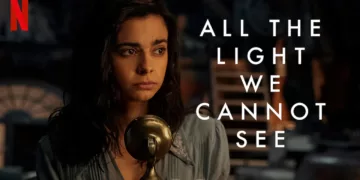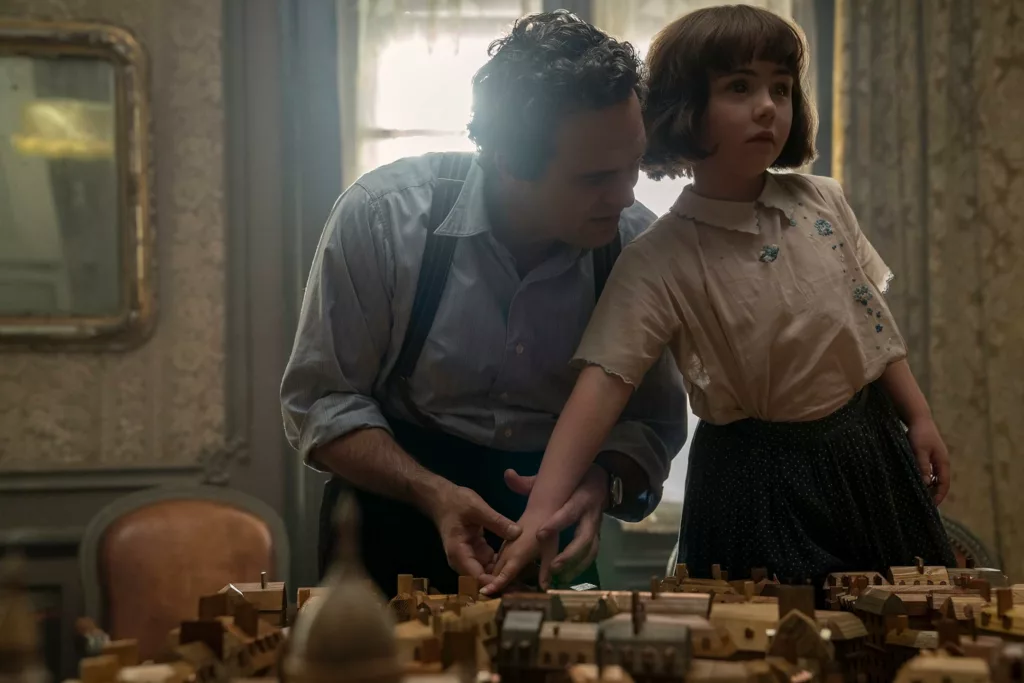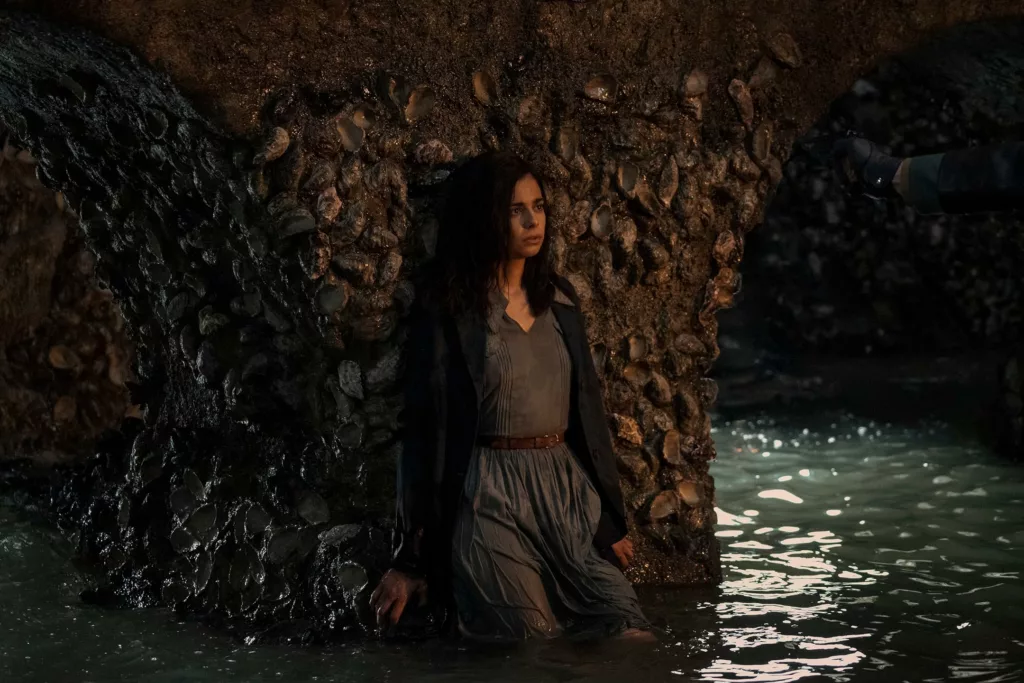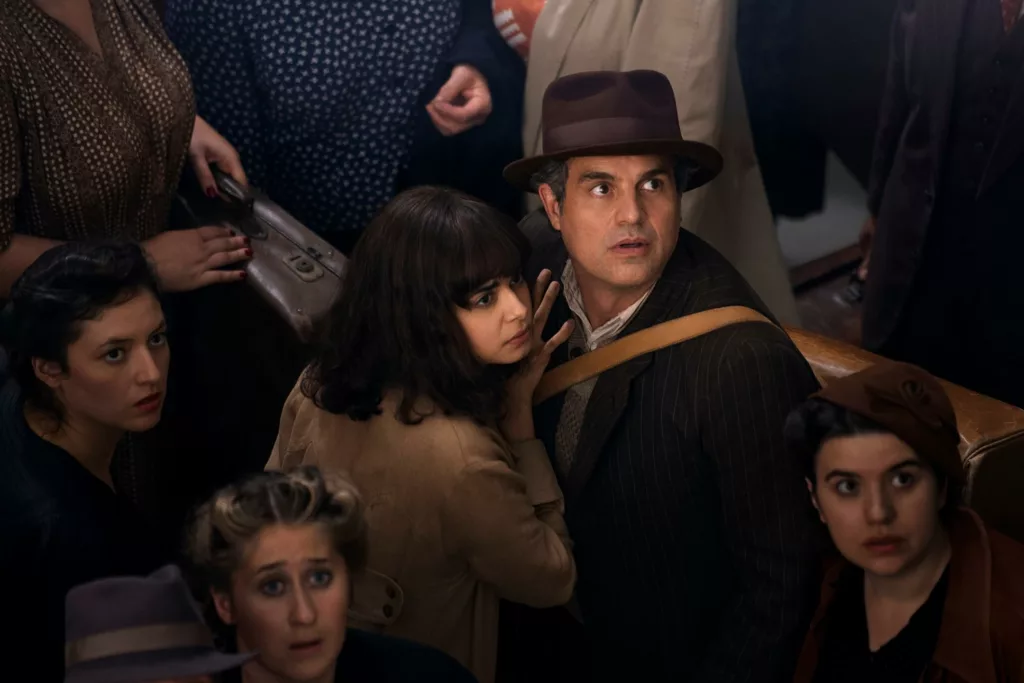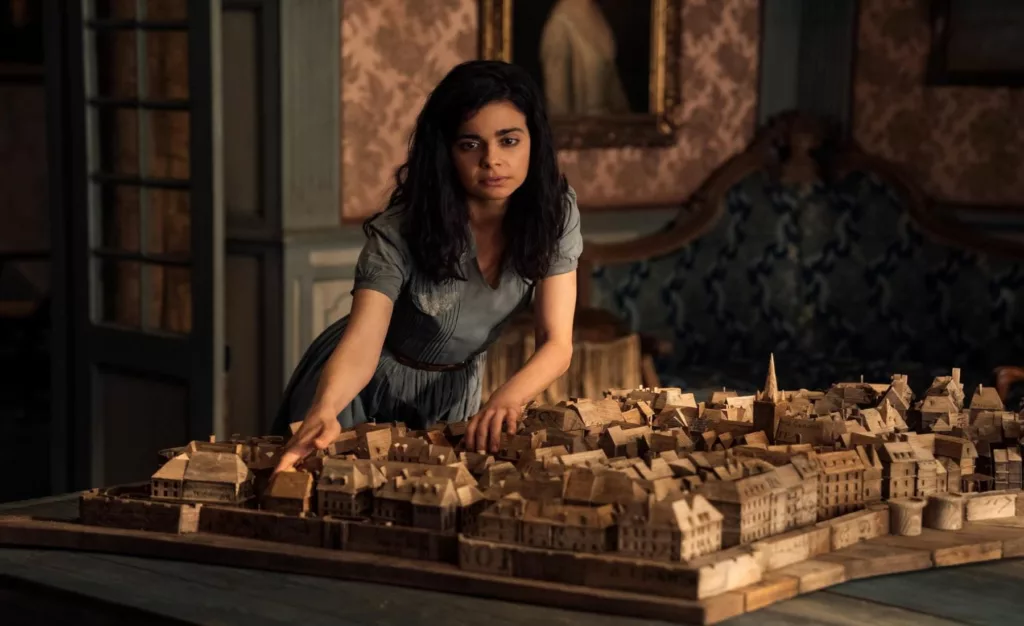All the Light We Cannot See arrives on Netflix with heavy expectations. The four-part miniseries is adapted from Anthony Doerr’s Pulitzer Prize-winning 2014 novel of the same name. With Stranger Things director Shawn Levy at the helm and Peaky Blinders creator Steven Knight penning the scripts, the pedigree is certainly there. Add in acting talents like Mark Ruffalo and Hugh Laurie, and this seems poised to be a prestige adaptation.
The story follows two young people whose paths fatefully intersect in World War II-era France: Marie-Laure LeBlanc (Aria Mia Loberti), a blind French girl aiding the resistance, and Werner Pfennig (Louis Hofmann), a technologically gifted German soldier. It jumps between perspectives and time periods in a nonlinear fashion as it builds to their meeting in the coastal town of Saint-Malo during the climactic Battle of Saint-Malo in 1944.
Having not read Doerr’s novel myself, I come to this adaptation with an open mind, ready to judge it on its own merits. In reviewing the full series, my aim is to assess whether this hyped Netflix production ultimately delivers a compelling viewing experience or falls victim to the common traps of adapting well-regarded source material. Does it honor the spirit of the book while standing alone as great television? Or does it lose something vital in translation? Those are the key questions I’ll explore in this critique.
Mixed Results from the Ensemble
The cast of All the Light We Cannot See is a mix of intriguing choices and questionable decisions. On the positive end, newcomer Aria Mia Loberti is a revelation as Marie-Laure. A legally blind actress discovered through an open casting call, Loberti brings authenticity and a magnetic screen presence that pops from the first scene. She never once hits a false note in embodying the courageous French heroine.
Elsewhere in the cast, however, some of the creative choices are less successful. In an effort to underline nationalities, the German characters speak with German accents while the French adopt British accents. This produces an unintended comedic effect whenever Hugh Laurie appears, as he speaks in his natural British cadence beside actors putting on airs. Even more distracting is Mark Ruffalo’s Daniel LeBlanc, who seemingly tries on a new random accent in every scene, veering from stilted British to gravelly generic.
The accent issue underlines how Levy leaned heavily on aesthetic choices over nuanced performances. The talented ensemble often feels like they are playing archetypes rather than fully realized humans. Louis Hofmann as Werner is relegated to wide-eyed staring as he receives constant metaphors about light and seeing. It’s only in scenes with Felix Kammerer that Hofmann comes alive, as Kammerer brings organic authenticity to every role. The limited use of Kammerer is indicative of the lost opportunities across this adaption to go deeper.
Still, despite flawed directorial decisions, the core cast brings enough emotional resonance in moments to carry us through. And Loberti’s star-making turn as Marie-Laure makes it easy to invest in her journey, accents be damned. With a more unified vision, this group surely could have produced something truly powerful.
Where Nuance Goes To Die
It becomes evident early on that the subtleties of Doerr’s novel have gotten lost in translation. In Steven Knight’s scripts, complex characters are flattened into archetypes of good and evil. Marie-Laure is an angelic force of pure goodness, her disability treated as her only flaw. Werner represents a “good Nazi” absolved of any wrongdoing. The villainous von Rumpel twirls his mustache in every scene. This simplification strips the story of nuance and moral ambiguity.
The problems are compounded by on-the-nose dialogue riddled with painful metaphors. Marie-Laure and Werner endlessly restate the central motif of “the light we cannot see” as if it were a profound Zen koan. These repetitive lines grow increasingly grating and hollow over time, sapping the script of any organic beauty.
Knight’s fractured timeline also creates needless plot holes and obvious twists. When the young Marie-Laure interacts with Etienne, we’ve already seen future scenes where she doesn’t recognize his voice as the Professor from her childhood radio. Musical cues essentially shout “plot twist coming!” without an ounce of subtlety. Jumping through time denies characters and audience alike the chance to make discoveries organically.
This clumsy storytelling extends to the ending, which reportedly smooths out the book’s more complex, bittersweet conclusion. The climactic meeting between Marie-Laure and Werner feels rushed and unearned. Major story elements get tossed away hastily, including the significance of the mythical Sea of Flames jewel. The softened ending rings false, trading the novel’s impact for easily digestible closure.
Overall, it’s apparent the nuance that gave Doerr’s book its power failed to survive the adaptation process. The script’s reliance on flimsy archetypes, spoon-fed dialogue, and artificial plot tricks suck the story dry of compelling moral complexity. This fundamentally hollow core is the fatal flaw that prevents the series from achieving any resonant emotional impact. A more skilled, thoughtful translation could have uncovered the beating heart beneath the flowery prose.
Precious Aesthetics Undermine Authenticity
On a purely technical level, All the Light We Cannot See is well-crafted. The cinematography and production design vividly bring to life the story’s 1940s period setting. Sweeping aerial shots of Saint-Malo have a rich cinematic allure. The sound design smartly foregrounds the power of radio and music in the characters’ lives. Sensory elements like rain and sand have vivid texture.
In terms of skill behind the camera, Levy delivers his most cinematic work to date. But the shallow sentimentality that has defined his filmography remains an issue. The director can’t resist precious aesthetic choices that undermine characters. Marie-Laure gets constant close-ups of her angelic face framed in radiant light, emphasizing her pure goodness. But this denies Loberti opportunities to reveal the character’s depths. Werner is similarly presented as wide-eyed and innocent, undercutting the darkness of his Nazi indoctrination.
Levy also avoids confronting the story’s inherent moral complexities. The horrors committed by Werner happen conveniently off-screen, allowing him to remain sympathetic. Violence from the Americans who “save” Saint-Malo goes unacknowledged. Levy’s kid-gloves treatment of the material comes across as cowardly artistic choices. The visceral realities of war get replaced by a prettified fairy tale.
Moments that feel poignant on paper curdle into mawkish sentiment in Levy’s hands. The book’s meditative lyricism morphs into overwritten metaphors and hokey speeches about “the light we cannot see.” Levy fails to ground the story with naturalistic humanity, instead steering into schmaltzy melodrama. For all his technical chops, the director’s tendency toward shallow sentiment smothers this adaptation.
Glossing Over Moral Complexity
For a story set during World War II, All the Light We Cannot See takes a curiously shallow view of moral complexity. The Nazis’ horrific atrocities get simplified into Indiana Jones-esque adventure tropes. Marie-Laure’s disability is presented as something that makes her special rather than a part of normal human diversity. The Americans who bombed Saint-Malo into rubble are treated as heroic liberators, their own violence unacknowledged. Nuance falls away at every turn.
This tendency is especially apparent in the portrayal of Werner as an apolitical “good Nazi.” His actions in service of the Reich occur conveniently off-screen, keeping him sympathetic. But glossing over the darkest aspects of his path creates a dangerous “not all Nazis” narrative. True redemption requires grappling with hard truths, not rewriting history to comfort audiences.
Meanwhile, Marie-Laure’s overt goodness risks making her disability into something that removes moral complexity rather than simply being part of the human experience. Her physical blindness becomes an on-the-nose metaphor that denies her character real depth. Reducing disability to a plot device or vessel for sentiment ultimately proves problematic.
In the end, the series seems unwilling to let any shades of gray challenge its black-and-white war narrative. Life during wartime, however, consists of impossible choices, wrestling with inner darkness, and recognizing pain on all sides. By treating its setting as mere decor rather than a minefield of moral complexity, All the Light We Cannot See rings hollow. Its failures may reflect wider issues in portraying disability and war honestly instead of just comfortably.
An Adaptation That Diminishes Its Source
All the Light We Cannot See arrives with incredibly strong source material, A-list talent in front of and behind the camera, and the full hype machine of Netflix behind it. This pedigree only amplifies the disappointment that it does not live up to its potential. Despite a few bright spots like Aria Mia Loberti’s star-making performance, the series is ultimately diminished by the artistic choices made in adaptation.
Director Shawn Levy opts for shallow sentimentality over nuance, flattening complex characters into dull archetypes. Screenwriter Steven Knight relies on spoon-fed metaphors and clumsy narrative tricks instead of thoughtful subtlety. The story’s rich moral complexity gets replaced by a facile portrayal of good versus evil. Strong performances struggle to shine through the cloying artifice.
After being positioned as Netflix’s big awards play for months, it is disheartening to see All the Light We Cannot See miss the mark so widely. It continues an alarming trend of the streaming service promoting mediocre adaptations as masterpieces, diminishing their standards for original programming.
With its pedigree and source material, this could have been a gorgeous miniseries that provided a unique perspective on World War II. Instead, it loses nearly everything that made the book a compelling and artful reading experience. It is unfortunate so much talent has been wasted, but hopefully future adaptations will learn from this failure.
The Review
All the Light We Cannot See
Despite flashes of potential, All the Light We Cannot See is an adaptation that loses nearly everything compelling and complex about its lauded source material. In sanding down the story's edges to create easily-digestible entertainment, the miniseries strips itself of nuance, moral ambiguity, and humanity. With its strong cast and technical chops, this could have been an illuminating character study set against the darkness of war. Instead, it provides a masterclass in how artistic cowardice and shallow sentimentality can dim even the brightest of stories.
PROS
- Strong source material in the Pulitzer Prize-winning novel
- Standout lead performance by newcomer Aria Mia Loberti
- Capable direction and technical elements like cinematography and production design
- Moments of solid acting from talented ensemble cast
- Effective period details capturing 1940s setting
CONS
- Adaptation flattens complex characters into dull archetypes
- Fractured timeline creates plot holes and obvious twists
- Sentimental directing undermines performances and storytelling
- Overwritten dialogue laden with painful metaphors
- Shoots too comfortably around moral complexity of WWII
- Falsely absolves "good Nazi" protagonist of wrongdoing
- Treats disability as quirky plot device rather than authentic experience
- Major change to ending denies story a real impact
